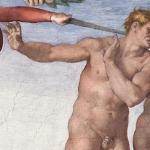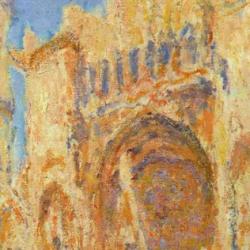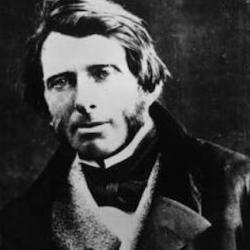In his 1876 letter in Fors Clavigera, Ruskin muses on the import of the sons of Ham. Mizraim, Phut, and Sion represent three African powers and three natural environments, the watered plain, the desert, and the sea. Each also represents a certain stage of human development:
“A. Egypt is essentially the Hamite slavish strength of body and intellect.
“B. Ethiopia, the Hamite slavish affliction of body and intellect; condemnation of the darkened race that can no more change its skin than the leopard its spots;s yet capable, in its desolation, of nobleness.”
“C. Tyre is the Hamite slavish pleasure of sensual and idolatrous art, clothing her nakedness with sea purple. She is lady of all beautiful carnal pride, and of the commerce that feeds it,—her power over the Israelite being to beguile, or help for pay, as Hiram.”
He claims that Ethiopia and Tyre are linked, not only historically but spiritually: “Tyre, the queen of commerce; Ethiopia, her goldbringing slave; the redemption of these being Christ’s utmost victory.”
His focus, thought, is on Egypt. Ruskin claims that “the spiritual meaning of Egyptian slavery is labour without hope, but having all the reward, and all the safety of labour absolute. Its beginning is to discipline and adorn the body,—its end is to embalm the body; its religion is first to restrain, then to judge, ‘whatsoever things are done in the body, whether they be good or evil.'” From Genesis 50, he concludes that “all fear of death, and embalming of death, and contemplating of death, and mourning for death, is the pure bondage of Egypt.”
This is not to say that Egypt is evil. In fact, it is a necessary stage in the education of Israel and of humanity: “whatsoever is formal, literal, miserable, material, in the deeds of human life, is the preparatory bondage of Egypt; of which, nevertheless, some formalism, some literalism, some misery, and some flesh-pot comfort, will always be needful for the education of such beasts as we are. So that, though, when Israel was a child, God loved him, and called his son out of Egypt, He preparatorily sent him into Egypt. And the first deliverer of Israel had to know the wisdom of Egypt before the wisdom of Arabia; and for the last deliverer of Israel, the dawn of infant thought, and the first vision of the earth He came to save, was under the palms of Nile.”
In short, “whatsoever, I say, in our necessary education among that scientific slime of Nile, is formal, literal, miserable, and material, is necessarily Egyptian.” This includes “brickmaking, scripture, flogging, and cooking,—upon which four heads of necessary art I take leave to descant a little.”
This typology leads him to a social critique. The nobility of England acts as if it has transcended the need for Egypt. They think they can avoid the slog of brickmaking. They have immanentized the eschaton: “Have you got past the flaming sword, back into Eden; and is your celestial opinion, there, that we miserable Egyptians are to work outside, here, for your dinners, and hand them through the wall to you at a tourniquet? or, as being yet true servants of the devil, while you are blessed, dish it up to you, spiritually hot, through a trap-door?”
It’s not merely that the nobility avoids Egypt; it forces others to remain in Egypt: “Fine anti-slavery people you are, forsooth! who think it is right not only to make slaves, but accursed slaves, of other people, that you may slip your dainty necks out of the collar! . . . You will sit at home, serene proprietor, not able, still less willing, to lift so much as a spadeful of Duddles yourself; but you will feed a certain number of brickmaking Ethiopian slaves thereon, as cheap as you can; and teach them to make bricks, as basely as they can; and you will put the meat out of their mouths into your own, and provide for their eternal salvation by gracious ministries from Uxbridge. A clerical friend of mine in that neighbourhood has, I hear, been greatly afflicted concerning the degenerate natures of brickmakers. Let him go and make, and burn, a pile or two with his own hands; he will thereby receive apocalyptic visions of a nature novel to his soul.”
He thinks that England should recognize the value of Egyptian drudgery: “if we will learn our elements in true Egyptian bondage, some good may come of it.”
It’s no accident that the nation of slavery is also the nation of writing. He refers to the myth of Theuth, who invented writing, and adds: “The Egyptian is . . . the scribe of scribes,—the supremely literary person of earth. The banks of Nile give him his rock volume: the reeds of Nile his paper roll. With cleaving chisel, and cloven reed, he writes thereon, exemplarily: the ark which his princess found among the paper reeds, is the true beginning of libraries,—Alexandrian, and all other. What you call Scripture, in special, coming out of it; the first portion written in Egyptian manner (it is said) with the finger of God.”
Victorian intellectuals should take note: “Slavery is good for us in the beginning, and for writingmasters we can find no better than these Mizraimites: see what rich lines of Scripture there are, along the black edges of those tombs. To understand at all how well they are done, we must at once begin to do the like, in some sort, ourselves.”












